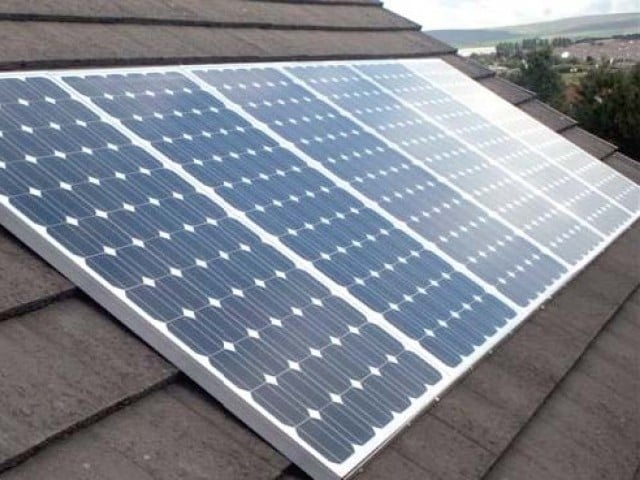ISLAMABAD:
The government on Thursday drastically changed the net metering policy, introducing regulations that slash benefits for new solar panel owners by 63% while forcing them to buy electricity from the national grid at rates over 550% higher than their sale price.
Under the new policy, rooftop solar panel owners will sell electricity at Rs10 per unit but must buy power at the prevailing rate — currently around Rs65 per unit — without the facility of adjusting imported units with exported units. This results in an enormous price difference of 550%, leaving solar consumers paying far more for electricity than they receive for their contributions to the grid.
The terms for existing rooftop solar panel users will change after their current contracts expire, which have a maximum term of seven years. This major policy shift was approved by the Economic Coordination Committee (ECC) of the Cabinet.
For new users, high-quality technical specifications have also been introduced to restrict the installation of low-quality solar panels.
Headed by Finance Minister Muhammad Aurangzeb, the ECC approved “amendments in Net Metering Regulations.” The Power Division presented this critical policy change as an additional agenda item, depriving committee members of the opportunity to discuss it in detail before the meeting.
The ECC approved the revised solar-based electricity generation policy, eliminating the concept of netting solar-produced electricity with the units received from the national grid. The amendments aim to reduce the financial burden on grid consumers, according to the finance ministry. The ECC also authorised the Power Division to issue proposed guidelines — pending Cabinet ratification — for NEPRA to incorporate into the regulatory framework.
As per the decision, the buyback rate for solar panel owners will drop from Rs27 per unit to Rs10 per unit, cutting their benefits by 63%. Meanwhile, any electricity purchased from the national grid will be charged at actual market prices, currently between Rs65 and Rs70 per unit, inclusive of all taxes.
The government justified this drastic policy change by citing an additional 90 paisa per unit burden on non-solar consumers. However, it has shown less concern for the Rs18 per unit in idle capacity payments and the approximately Rs600 billion lost annually due to theft and bill under-recovery.
Following discussions, the ECC approved the reduction in the buyback rate and gave NEPRA the authority to adjust this rate in the future without requiring government approval.
A fundamental change in the pricing mechanism means that imported units from the national grid and exported units from rooftop solar systems will now be treated separately for billing. Exported units will be bought at the reduced rate of Rs10 per unit, while imported units will be billed at applicable peak and off-peak rates, inclusive of taxes and surcharges.
Existing net-metered consumers with valid licenses and agreements under NEPRA’s Alternative & Renewable Energy Distributed Generation and Net Metering Regulations, 2015 will be exempt from the revised policy — until their current agreements expire.
The net metering regime was introduced in 2015 to promote renewable energy, but it has reportedly hurt the business interests of imported-fuel-based power plant owners.
The ECC also revised the capacity limit for distributed generation facilities. Previously capped at 1.5 times the sanctioned load, it has now been restricted to a one-to-one ratio, further reducing the incentive to install solar panels.
The ECC was informed that rooftop solar panel installations have surged, growing from a total capacity of 5 MW in 2017 to 4,135 MW by December 2024.
A major driver behind this growth has been the flawed energy tariff policies adopted by successive governments under pressure from the International Monetary Fund (IMF) and the World Bank. As a result, electricity prices have soared to over Rs65 per unit, making it unaffordable for many consumers.
The number of solar net-metering consumers increased significantly, rising from 226,440 in October 2024 to 283,000 by December 2024. The total installed capacity also surged from 321 MW in 2021 to 4,124 MW in December 2024, highlighting the rapid expansion of net metering.
According to the finance ministry, 80% of solar net-metering consumers are concentrated in nine major cities, primarily in affluent areas.
Despite Prime Minister Shehbaz Sharif’s efforts to lower electricity prices, the energy ministry has yet to propose a viable plan that meets IMF requirements. The only feasible option available is an estimated Rs2.5 per unit relief through negative fuel price adjustments.
The energy ministry argues that 67% of the revenue requirement comprises fixed costs, including capacity charges for power producers and operational expenses for power distribution and transmission entities. Since net-metering consumers do not significantly contribute to these fixed costs, the government claims that their growing numbers are straining the system.
The ECC was informed that net-metering capacity led to a reduction of 3.2 billion electricity units sold in the last fiscal year, adding an extra financial burden of Rs101 billionor 90 paisa per uniton other consumers. This financial impact is expected to grow, with projected sales reductions reaching 18.8 billion units by 2034, potentially burdening grid consumers with an additional Rs545 billion in costs, or Rs3.6 per unit in tariffs.
The ECC approved major policy changes, including capping hosting capacity on transformers and feeders based on studies by Distribution Companies. Excess exported electricity will be credited to future bills but cannot be cashed out. New inverter standards will require real-time grid interaction, anti-islanding protection, and remote monitoring. Distributed generation capacity must not exceed the sanctioned load, with penalties for exceeding limits. Lastly, the net-metering contract period has been reduced from seven years to five.

